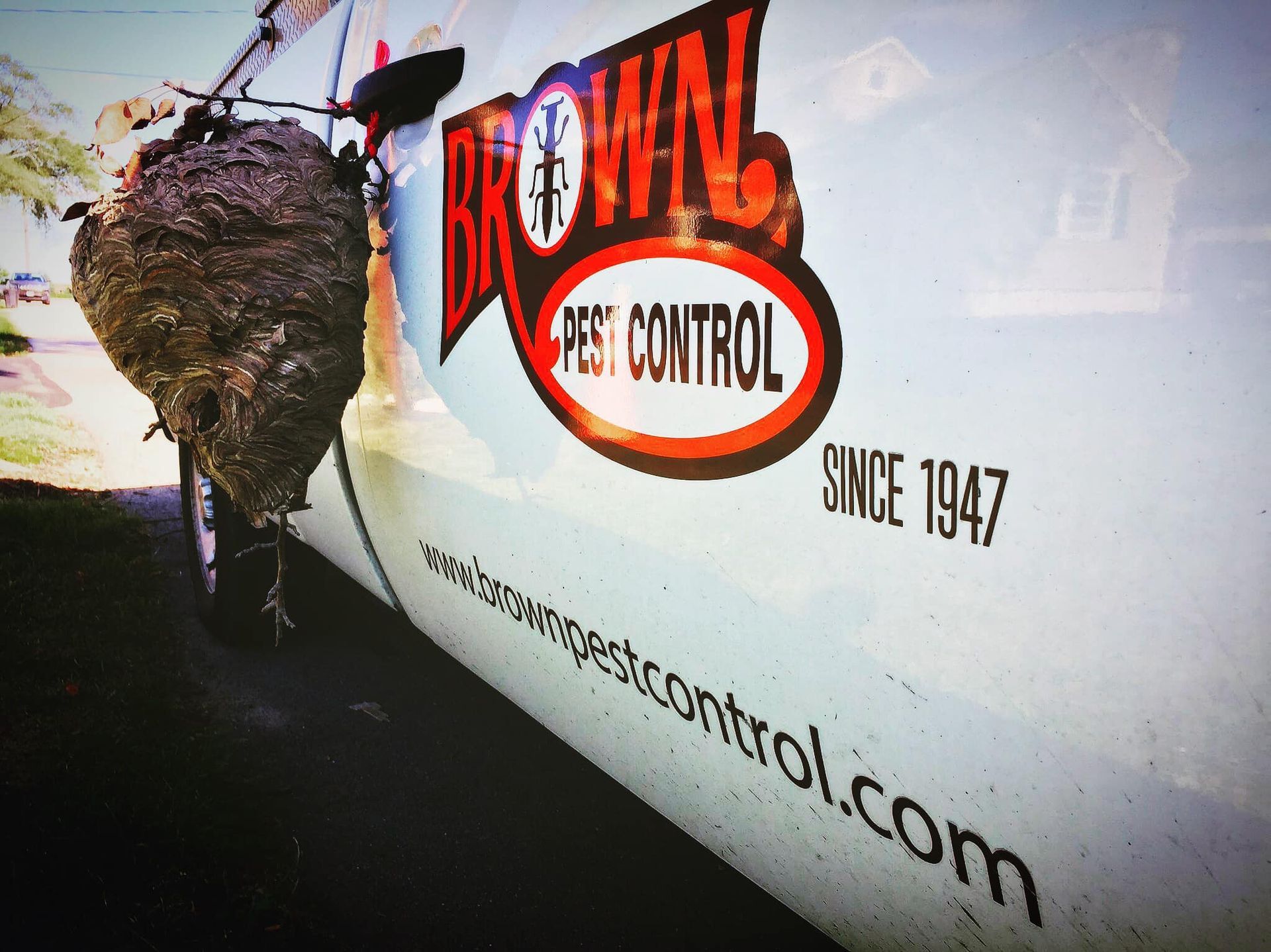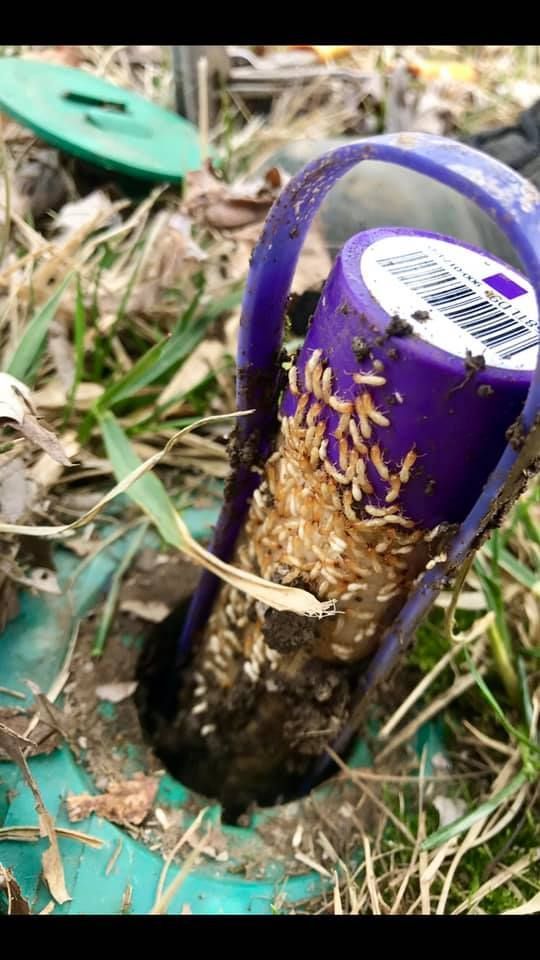Pest Control in Dayton, OH and Surrounding Areas
Request Quote
Hero Request Form
Pest-Free Living: Your Solution Since 1947
For over seven decades, Brown Pest Control Inc has been the trusted name in pest management across the Greater Dayton area and Miami Valley. Our deep-rooted commitment to excellence and customer satisfaction has made us a cornerstone of the community since 1947. With our team of state-licensed technicians, we've honed our craft to deliver unparalleled pest control services for both residential and commercial properties. We offer free, same-day quotes to get your space rid of pests as soon as possible.
At Brown Pest Control Inc, we understand that pests don't just invade spaces; they invade peace of mind. That's why we've dedicated ourselves to providing swift, effective solutions that go beyond mere extermination. Our comprehensive approach addresses current infestations while implementing preventative measures to safeguard your property against future invasions. Whether you're a homeowner seeking tranquility or a business owner protecting your investment, we cater to your needs.
Request a quote today to get started with pest control in Dayton, OH and the surrounding areas!
Why Choose Brown Pest Control Inc?
Choosing Brown Pest Control Inc means partnering with a local, family-owned business that understands the unique pest challenges of our region. Our commitment to excellence has earned us the title of Neighborhood's Favorite for four consecutive years (2021-2024). We provide peace of mind with a satisfaction guarantee, same-day response to quote requests, and necessary documentation for mortgage approvals.
We value our community, offering a 10% discount to veterans and seniors. When you choose Brown Pest Control, you're investing in a pest-free future with a company that has stood the test of time and continues to evolve with the latest industry advancements.
State-Licensed Technicians
Over 100 Years of Combined Experience
Free Quotes Available With Same-Day Responses
Mortgage Approval Paperwork Assistance
10% Off Services for Veterans and Seniors
Satisfaction Guaranteed
Termite Protection
Our residential termite protection service is designed to safeguard your most valuable asset - your home. We employ cutting-edge techniques and environmentally conscious products to create an impenetrable barrier against these wood-destroying insects. Our expert technicians conduct thorough inspections and implement tailored treatment plans to eliminate existing colonies and prevent future infestations.
General Pest Protection Plans
Our comprehensive general pest protection plans offer year-round defense against a wide array of common household pests. This proactive approach includes regular inspections and applications to keep your home pest-free throughout the seasons. Brown Pest Control Inc targets everything from ants and spiders to roaches and rodents, ensuring your living spaces remain comfortable and hygienic.
Bed Bug Treatments
Bed bugs can turn your sanctuary into a nightmare. Our specialized bed bug treatments include a 4 - step approach and meticulous inspection processes to eradicate these persistent pests. We not only eliminate the current infestation but also educate you on prevention strategies to avoid future occurrences.
Rodent Control Plans
Our rodent control services go beyond simple trapping. Our goal is to not just remove the current rodent population but to prevent future invasions, protecting your property and health.
One-Time Pest Control Service
For those unexpected pest emergencies, our one-time pest control service provides immediate relief. This service is perfect for addressing sudden infestations or preparing for special events. Our technicians quickly assess the situation and implement targeted treatments to resolve your pest issues promptly and efficiently.
Exterior Perimeter Protection
Our exterior perimeter protection service creates a defensive barrier around your property, intercepting pests before they can enter your space. This proactive approach significantly reduces the likelihood of indoor pest problems, providing a first line of defense against a wide range of pests.
Integrative Pest Management (IPM)
We pride ourselves on our Integrative Pest Management (IPM) approach, which focuses on long-term prevention and control strategies. This environmentally-sensitive method aims to manage pest populations with minimal impact on human health and the environment. Our IPM strategies are tailored to each situation, ensuring effective and sustainable pest control.
Food Service Plans
For restaurants, cafeterias, and other food service establishments, we offer specialized food service plans. These plans are designed to meet the stringent pest control requirements of the food industry, ensuring compliance with health regulations while maintaining a pest-free environment. Our services include regular inspections, targeted treatments, and documentation to support your food safety protocols.
How a Pest-Free Home Impacts Health and Well-Being
At Brown Pest Control, we understand that keeping your home free of pests goes far beyond protecting your property—it’s essential for the health and well-being of your family. Pests such as rodents, cockroaches, and mosquitoes can carry harmful bacteria, viruses, and allergens that affect everyone in the household. For families searching for reliable pest control in Dayton, OH, understanding these risks highlights the importance of proactive and professional protection.
A pest-free home directly contributes to cleaner, safer living spaces. Rodents, for example, can contaminate food and surfaces with droppings and urine, while cockroaches are known to trigger allergies and asthma. Even seemingly minor infestations can lead to more serious health concerns over time. Families who prioritize pest control in Dayton, OH often report greater peace of mind, knowing their loved ones are less exposed to potential disease and allergens.
Beyond physical health, a pest-free home also supports mental well-being. Knowing that your living space is protected from unwanted intruders reduces stress and anxiety, allowing everyone in the household to feel more comfortable and secure. For homeowners, the reassurance that comes from professional treatment and ongoing prevention creates a sense of control and confidence in their environment.
Families and property owners seeking pest control in Dayton, OH benefit from a comprehensive approach that addresses current infestations and prevents future issues. At Brown Pest Control, we combine effective treatments, preventive plans, and expert guidance to ensure homes remain healthy and secure. Protecting your home from pests isn’t just about comfort—it’s about safeguarding the well-being of everyone who lives there.
Understanding Pest Behavior to Protect Your Property
At Brown Pest Control, we know that effective pest management starts with understanding the behavior of the pests you’re trying to control. By learning how pests live, eat, and move, homeowners and business owners can better protect their properties from damage, contamination, and health risks. For those seeking reliable pest control in Dayton, OH, this knowledge is key to implementing strategies that prevent infestations before they become serious problems.
Different pests have unique habits that influence how they interact with your home. Rodents are nocturnal and often enter through small cracks or gaps in foundations, while termites silently consume wood over time, potentially causing costly structural damage. Cockroaches and ants are drawn to food sources and moisture, and bed bugs are experts at hiding in cracks and crevices near sleeping areas.
Understanding these behaviors allows families to take preventive steps and make informed decisions about professional pest control in Dayton, OH. Environmental factors also play a role. Seasonal changes, humidity, and landscaping can all influence pest activity.
Families and property owners who choose professional pest control in Dayton, OH benefit from solutions that are informed by knowledge of pest habits, environmental factors, and preventive strategies. At Brown Pest Control, we combine experience, education, and advanced techniques to protect homes and businesses while giving families peace of mind. Understanding how pests operate is the first step toward a safer, healthier, and pest-free property.
Here's what our satisfied customers are saying...
At Brown Pest Control Inc, we take pride in providing exceptional residential and commercial pest control services, as well as termite protection education to our customers. We would be grateful if you could share your thoughts about our local and family-owned business with others. Your feedback helps us improve and helps others make informed decisions. Please take a moment to leave a review of Brown Pest Control and let others know what you think.





Share On: